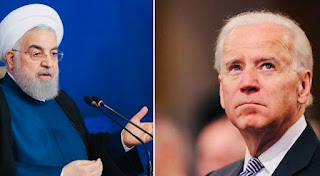BIDEN AMERICA - IRAN RELATIONS

Joe Biden, who achieved success against Donald Trump in the November 3 US presidential race, which took place in the midst of the coranavirus epidemic, under the extraordinary conditions of mass unemployment and a rapidly shrinking economy, was elected the 46th president of the USA according to unofficial results. Trump became the second president, who lost his seat after failing to win the election while competing for a second term in the post-Cold War period. The last president in this situation was George Bush. Like Trump, he was a Republican. Acting in search of a hierarchical "unipolar system" with the motto "America First", damaging the understanding of alliance and making power policy a more prominent element in the international relations of the United States, Trump has not only adopted the foreign policy approach but also the traditional decision-making mechanisms at home It has also been constantly criticized for its leader-centered management approach (The Administrative Presidency) that breaks conventions and causes conflicts between institutions. Considering the differences in the foreign policy visions of the "Republican" and "Democratic" parties, as well as the concerns of the new presidents to separate themselves from their predecessors and make a difference in foreign policy, it can be thought that there will be significant changes in the US foreign policy, including relations with Iran during the Biden period. It is also expected that Biden will adopt a different model (The Institutional Presidency) from Trump's presidential model.

Although it remains uncertain how Biden will implement his "restorationist" approach in terms of foreign policy, Biden outlined the basic principles of his foreign policy that he will implement during the election campaign; returning to international agreements, revitalizing longstanding alliances, reducing the US military presence in the Middle East, and prioritizing the promotion and defense of democracy. Also, Biden has a foreign policy team of experienced advisors. This brings with it the interpretation that "common mind" will be operated. In addition to Jack Sullivan, who served as director of policy and planning at the State Department under former President Obama, Nicholas Burns, who held senior foreign policy positions under both Republican George W. Bush and Democrat Bill Clinton, are on this team. Antony Blinken, who served as deputy foreign minister and deputy national security adviser during the Obama era, is one of the veteran figures on the team. Considering the team he works with, it is not correct to assume that Biden will adopt all of Obama's policies in the same way, even though he calls "the Second Obama" for Biden, and much has changed in the past four years. This also applies to US-Iranian relations.
Biden Era "Détente" Expectation
On May 8, 2018, Trump unilaterally pulled the US out of the Nuclear Agreement, known as the JCPOA (Comprehensive Joint Action Plan), from Iran to report all nuclear weapons work to the International Atomic Energy Agency (IAEA) and uranium including heavy water reactors. He wanted him to cease enrichment work, stop producing ballistic missiles, and stop testing and developing missiles capable of carrying nuclear warheads. Trump, who also asked Iran to stop aid to "terrorist groups", including the Lebanese Hezbollah, Hamas and the Palestinian Islamic Jihad; He also said that he should stop supporting the rebels in Yemen, stop threatening Israel and withdraw all his forces from Syria, and targeted regional expansionism that disturbed Israel and the Gulf.
Despite the opposition to the Iranian regime, which is one of the rare common points of Republicans and Democrats, it is known that US Presidents from both parties, from Republican Ronald Reagan to Democrat Barack Obama, are seeking reconciliation or a détente in relations with the Tehran administration. Therefore, Biden, who emphasized the necessity of credibility in diplomacy, has stated many times that he will return to the Nuclear Agreement and signaled that he will seek a softening with Iran. However, this is thought to be dependent on certain conditions. Biden's Foreign Advisor, Antony Blinken, said Joe Biden would seek a new and improved deal with Iran, “Iran will have to fully comply with its obligations under the current deal. If it does, then the Biden administration will return to a harmonious agreement again. But we will use this as a platform to make a longer term deal. " said. Thus, Blinken has clearly demonstrated that the current agreement is not considered sufficient by the Biden administration. Therefore, in the words of Walter Russell Mead, Biden will also show on Iran that he will not be a "Second Obama".
Also, as the US special envoy to Iran, Elliot Abrams, it is not possible for the Biden administration to return to the Nuclear Deal unless Tehran makes significant concessions. This is different from the US rejoining the World Health Organization. Therefore, the Biden administration will continue to use the Trump administration's sanctions to achieve new concessions in any negotiation with Iran. In addition, some sanctions are related to human rights, anti-terrorism sanctions. Since these are not directly related to Iran's nuclear activities, they are difficult to remove without some behavioral changes on the Iranian side.
The "maximum pressure" strategy of Trump's Iran policy by the Democrats did not yield the desired results, did not stop Iran's nuclear program and ballistic missile program, and could not prevent its regional aggression. Although criticisms were being made that it could withdraw and thus increase its nuclear weapons capacity more freely, which could force the US into a military intervention against Iran, it seems that Iran would not be able to soften its relations with the US suddenly during the Biden period without making some policy changes or making concessions. Although there is an expectation of "détente" with the arrival of Biden, it is still necessary to overcome some difficult processes in US-Iran relations. Therefore, for Iran, even though Trump lost the election, "negotiation" with Washington seems inevitable under all circumstances.
Transformation in Iranian Domestic Politics
The cycle of the US presidential elections and the change of administration also have effects on Tehran. It seems that a "moderate" or "hard" government is coming to power in Iran to deal with the new Washington administration. As will be remembered, the ideologically-driven hawks in Washington under Bush repeatedly called for military action against Iran, winning a victory over Mohammed Khatami's hard-line rivals. In 2005, Mahmoud Ahmadinejad, a conservative mayor of Tehran and a former member of the Revolutionary Guards Army (DMO), won the presidential election, ending Khatami's reform period. In retrospect, the failure of the Khatami administration to fulfill its promises, combined with the impending threat from the US, paved the way for the increased influence of security circles in Iran and the rise of conservatives.
Similarly, Trump's "maximum pressure" campaign has once again shaped Iranian politics in favor of conservatives, weakening the moderate Rouhani government; It strengthened the hardliners and the Revolutionary Guards Army. As in the 2004 Parliamentary Elections, many reformist-leaning candidates were vetoed in the February 21, 2020 Parliamentary Elections. While the conservatives constituted 79% of the parliament in these elections, Muhammed Bakır Kalibaf, a former DMO commander, was elected as the president of the assembly. Although the parliament does not have a major role in Iran's foreign policy decision-making mechanism, the rise of conservatives / radicals in Iranian politics is important for the future of the Nuclear Deal.
Iran is also cautious about the policies Biden will implement, even though Biden is a preferable president for the Tehran administration and makes statements that he will return to the Nuclear Deal. Revolution Guide Ali Khamenei said in a statement he made on his Twitter account, “What they said about the situation in the USA and the elections! This is an example of the ugly face of liberal democracy in the US. Whatever the result, one thing is absolutely clear; The political, civil and moral downfall of the US regime. ” He revealed that he does not trust the US administrations. President Rouhani, on the other hand, takes a more moderate attitude by saying that if the US administration chooses to change the course, it may change the realities on the ground, but Iran will be prepared for the worst, but they are aware that the conditions for a sigh of relief have not yet been created.
As a result, Iran will have to reconsider its position with the Biden era. This means either continuing to violate the Nuclear Deal or returning to its commitments and agreeing to its renewal by sitting at the negotiating table with the United States. This decision will be made by the collective decision of the system (establishment) as with the nuclear file or other important national security issues. Therefore, this difficult process, which will also affect Iran's 2021 Presidential Elections, will be decisive for the new Iranian president to be "conservative" or "reformist / moderate".












Comments
Post a Comment